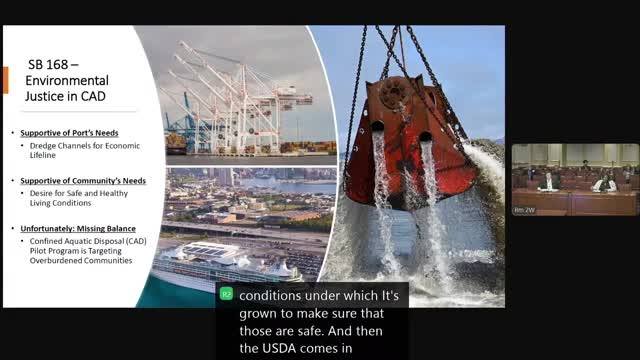Bill would bar confined aquatic disposal cells within five miles of 'overburdened' communities in Baltimore area
Get AI-powered insights, summaries, and transcripts
Subscribe
Summary
Senate Bill 168 would prohibit confined aquatic disposal (CAD) cells within five miles of Department‑designated "overburdened" census tracts, aiming to prevent placement of dredged or contaminated sediment storage near communities with high pollution burdens.
Senator Simonaire presented Senate Bill 168 to prohibit creation of confined aquatic disposal (CAD) cells in or within five miles of census tracts designated as "overburdened" by the Department of the Environment. The sponsor said the measure is intended to prevent further concentration of dredged or contaminated sediment disposal near communities that already carry disproportionate environmental burdens.
Senator Simonaire described outreach and town halls after initial port planning for CAD sites and said communities felt excluded from decision‑making. He proposed using an existing statutory definition for "overburdened community" (based on percentiles for pollution and demographic indicators) and imposing a five‑mile exclusion for CAD cells in those areas, modeled in part on existing statutory protections that ban certain disposal within five miles of Hart‑Miller Island.
A broad coalition of community and environmental witnesses testified in favor: League of Women Voters of Maryland, local residents and volunteer scientists, CASA (immigrant advocacy), the Anne Arundel Watershed Steward, and others described heavy local pollution, human‑health concerns, and potential ecological risks from CAD operations in the Patapsco and outer harbor. Testimony raised technical and environmental objections: speakers said CAD operations may stir contaminated sediments, double dredging volumes, harm benthic organisms, and pose risks to nearby restoration projects and recreational uses.
Senator Simonaire said he had proposed an amendment to tie the bill's language to "dredged material from Baltimore Harbor" rather than a broad undefined category, and said he would work with MDE and other stakeholders. MDE's testimony was informational and raised policy‑design questions; the Maryland Port Administration and some industry stakeholders had previously proposed in‑house studies and pilot projects and have emphasized operational flexibility.
Witnesses urged passage of SB 168 as a targeted, geographically constrained environmental‑justice safeguard; the transcript records extensive public testimony in support and discussion but no formal committee vote on the bill that day.
